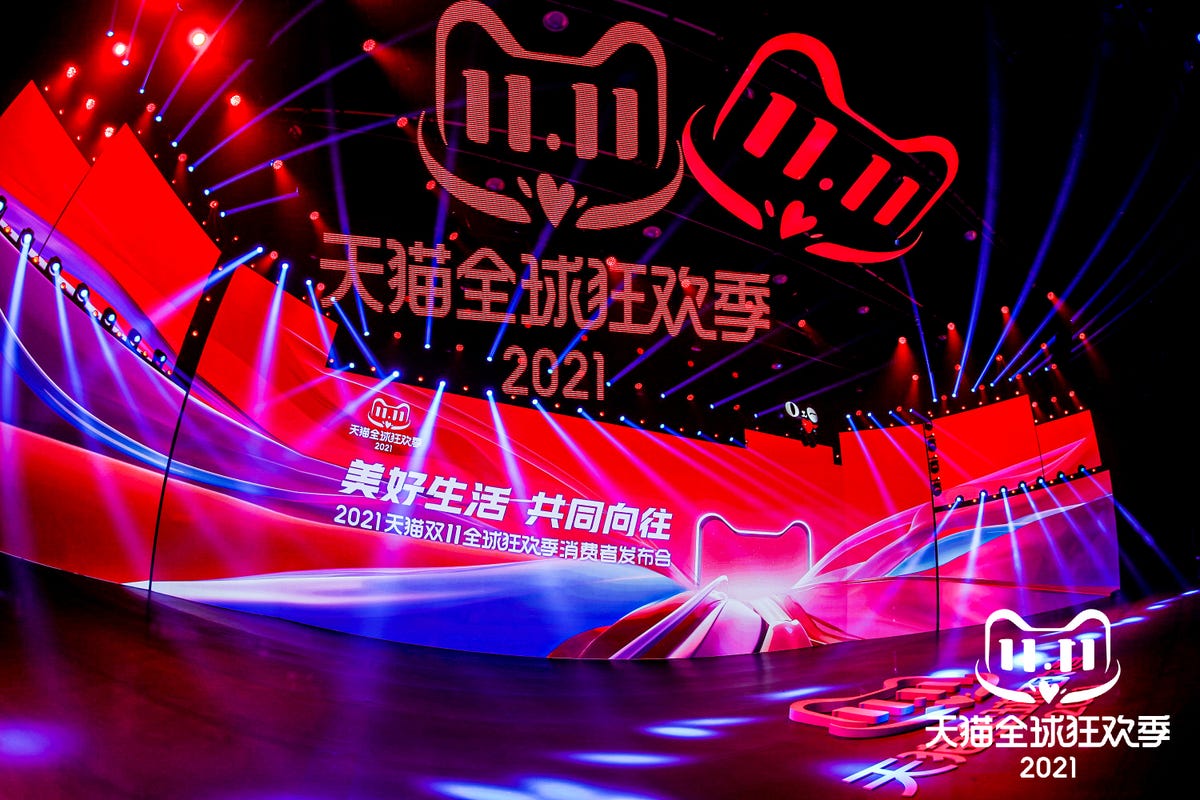
Alibaba to hold annual 11.11 shopping event in a new Chinese operating environment
[ad_1]

Image: Alibaba Group
The countdown is on for the main event of Alibaba Group’s 11.11 Global Shopping Event happening this Thursday, November 11.
The company is claiming the three-week shopping event, which kicked off at the end of October, is its largest to date: There are more than 290,000 brands participating, and over 14 million deals offered on Tmall to 900-plus million consumers in China.
These numbers include 2,000 Australian brands listed on Tmall and Tmall Global, around 80% of which entered China for the first time through the Chinese marketplaces, while New Zealand brands make up over 700 brands of the total. Some of the top Australian brands on Tmall Global include Swisse, Blackmores, and LifeSpace.
But unlike previous years, the 2021 shopping event will be breaking traditions slightly.
Contents
Measuring growth in a different way
Over the years, Alibaba has measured the event’s success based on the total gross merchandise volume (GMV), and each time the results smash the previous GMV number. But this year, the Chinese tech giant plans to focus less on GMV numbers and more on the impact its major shopping event has on sustainability.
“We have been shifting our focus from pure GMV growth to sustainable growth,” Alibaba Group CMO Chris Tung told media recently.
“We have put our focus on how to promote the green agenda, how to reuse our green technology to provide a sustainable growth together with our brand partners.
“With the influence and reach of 11.11, I think this is the best chance for us to not only help sell the products, but also to deliver the message to shift the consumer mindset to a more sustainable consumption concept — this is critical for us.”
But, why now? Tung describes the decision as a coming-of-age moment for the 11.11 shopping event.
“In the early stages of 11.11, we focused on growth, the same way that parents would focus on a child’s height and strength. But as a child becomes a teenager, the parents’ shift their focus to nurturing the child’s sense of responsibility; the role he or she plays in society. That is what we’re doing now,” he said.
“11.11 has blossomed into a mature teenager. It is crucial for Alibaba to now focus on building up its value system, helping it find its ability to create value for the community and the society at large.”
For the first time, the Chinese tech giant has created a dedicated vertical to showcase energy-efficient and low-impact products. It has also issued 100 million yuan worth of “green vouchers” to incentivise customers to shop green.
The company’s logistic arm Cainiao Network, meanwhile, has rolled out over 60,000 package collection and recycling stations across China and implemented 10,000 Cainiao post stations where users can reuse parcel packaging.
Let’s be mostly inclusive
The other aspect of this year’s event will be promoting inclusivity. From Alibaba’s perspective, inclusivity means enhancing the retail experiences for its elderly shoppers by adding “senior mode” to its Taobao app. This includes features such as larger font and icons, simplified navigation, and voice-assisted technology.
It’s also curating products targeted at Gen Z shoppers on Tmall by offering recommendations of trending products that appeal to them, such as Chinese heritage-themed goods, art toys, and blind boxes.
Plus, consumers are being encouraged to support Alibaba’s “Goods for Good” program. Launched in 2006, it enables merchants to donate a portion of their sales to charitable organisations of their choice. The donations from this year’s festival will provide support to three major beneficiary groups: Elderly citizens living in solitude, “left-behind children” in remote areas, and low-income workers.
To focus on inclusivity is an interesting pick for Alibaba; its version is far less controversial, however, and perhaps intentionally. It keeps them clear of the recent crackdown across China on androgynous males, mainly celebrities. This was after President Xi Jingping called for a “national rejuvenation” and reportedly ordered broadcasters to encourage “masculinity” and put a stop to “abnormal beauty standards” such as “niangpao” — literally, “girlie guns” — because it does not conform to the country’s traditional culture.
Watch it, then buy it
Livestreaming will continue to be another important component of the festival. It was a feature that Li Jiaqi, otherwise widely known as China’s Lipstick King, took advantage of on the first day of the annual shopping event. Following a 12-hour livestream, Li, who somehow manage to survive China’s crackdown on androgyny, sold $1.9 million in goods on the first day of the annual shopping event, after attracting some 250 million views.
“Livestreaming is one that has been a very important growth driver to engage users and encourage more online transactions. It is a key marketing pillar to help brands better connect with their target audiences,” Tung said.
“We have been working with brands to upgrade their livestreaming capabilities to help them interact with customers directly and shorten the connection between them while offering a smarter selection of products.”
Connecting brands to shoppers
This year’s event has also factored in the increase in demand for cross-border shopping by consumers in China, which has resulted due to travel limitations caused by COVID-19. Tmall Global has built its own key opinion consumer capabilities to help Chinese consumers learn about new products from overseas brands through short video content in its “New Discovery” feature.
At the same time, Alibaba’s logistics arm, Cainiao, has upgraded its smart logistics capabilities, an Alibaba spokesperson told ZDNet, noting that as a work around to avoid any supply chain issues, goods were shipped to bonded warehouses in China some time before the 11.11 Global Shopping Festival sales period.
“In fact, over 300 million international goods from 87 countries and regions, including Australia, have been pre-stocked by Cainiao in its bonded warehouses in China,” the spokesperson said.
Earlier in the year, Alibaba was slapped with a record 18.2 billion yuan fine for breaching China’s antitrust regulations and “abusing [its] market dominance”. The Chinese company said it would “accept” the ruling.
China’s State Administration for Market Regulation (SAMR) said in a statement that Alibaba had been abusing its strong market position since 2015 to prevent merchants from using other online e-commerce platforms. It said such practices impacted the free movement of goods and services, infringing on a merchant’s business interests, and in breach of the country’s anti-monopoly laws.
But it’s not just the company that has been facing pressure from the Chinese government. After the company’s founder Jack Ma criticised China’s rigid regulation and the state’s dominance over the banking system, he has been largely out of public view. Last month, however, there were reports the retired billionaire was briefly in Hong Kong and then on an agriculture study tour in Europe, visiting a number of research institutes in the Netherlands to learn about agriculture and technology.
The company’s fintech arm Ant Group was also later called up by China’s central bank to discuss its regulatory compliance, and its IPO was called off after regulators said Ant’s listing on the Shanghai stock exchange no longer met regulatory and disclosure requirements.
In an updated statement provided to ZDNet, an Alibaba spokesperson concedes the scrutiny that tech companies, like Alibaba, have recently faced in China is just all part of doing business in the country.
“Innovation and regulation often go hand-in-hand — it’s what ensures the development of a healthy and fair economy,” the spokesperson said.
“China is engaged in digitising its fast-growing economy, and building a regulatory framework is an essential part of this process. It’s not targeting any specific company. It’s about establishing the basis on which the internet economy will work to benefit everyone in China.
“No matter where we operate in the world, we will always comply with all applicable laws and regulations and continue to stay compliant in light of any regulatory changes.”
MORE FROM ALIBABA
[ad_2]
Source link




